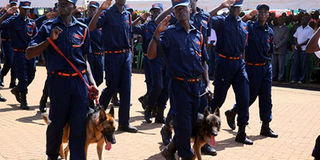Private security guards to get extensive training

Private security guards in a march-past during Labour Day celebrations at Jomo Kenyatta Sports ground in Kisumu on May 1, 2018. PHOTO | FILE | NATION MEDIA GROUP
What you need to know:
- Anyone wishing to be a guard would have to attend 240 hours of training before being allowed into the field.
- Kenya Private Security Authority director general Fazul Mahamed said the curriculum would modernise the industry.
The close to 700,000 private guards in Kenya will get comprehensive training as the government seeks to raise their calibre to match the need for their services.
A draft of a curriculum to be rolled out by the government shows they will be equipped with skills that go beyond the routine sentry and guard work.
The curriculum is an initiative of the Private Security Regulatory Authority (PSRA).
Besides training on basic procedures, the guards will be equipped with skills to detect security risks, threats, hazards and how to respond effectively in collaboration with other agencies.
Crucially, the curriculum has a component on counter-terrorism, informed by rising threats, whose outcomes have left private security guards among the victims.
REFRESHER
These would be complemented by training on emergency responses, health and safety, effective communication and conflict management, handling of equipment, ethics and integrity, report writing and career progression.
The team that drafted the syllabus was drawn from PSRA, National Police Service, National Intelligence Service, Kenya Defence Forces and security experts.
Anyone wishing to be a guard would have to attend 240 hours of training before being allowed into the field.
Based on an ordinary eight-hour working day, that translates to a month of training.
A hundred and sixty hours or 20 days would be for attachment. Existing guards will take a 40-hour refresher course.
The training durations are contained in a draft syllabus seen by the Nation.
TERRORISM
The draft says the heaviest emphasis would be on emergency first aid, where new guards will spend 12 hours in training while the existing ones will take six hours.
There is a course on counter-terrorism that will take at least six hours for the new entrants.
“Topics include the identifications of terrorist groups which are willing to use explosives or other violent means to kill. Upon completion, the student will have a good understanding of terrorism,” the draft guideline says.
After training, which the drafters say must take place in the classroom, the learners will sit an examination.
“Only students who have attended an in-class training course in full will qualify to take the test(s),” the regulations say.
COLLABORATORS
Kenya Private Security Authority director general Fazul Mahamed said the curriculum would modernise the industry.
“This curriculum will instil capacity in the guards to detect, deter and effectively respond to threats,” Mr Mahamed told the Nation.
“This is a holistic approach that involves the government and the private security industry.”
He told players in the sector in December that the training would be carried out in collaboration with Technical Vocational Education and Training Institutions and the National Industrial Training Authority.





